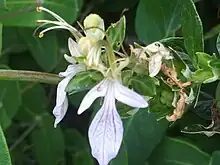germander
English

Etymology
Late Middle English, from French germandrée, itself from Medieval Latin chamaedrys, from Ancient Greek χαμαίδρῡς (khamaídrūs, literally “ground-oak”).
Pronunciation
- (General American) IPA(key): /d͡ʒɚˈmændɚ/
- (Received Pronunciation) IPA(key): /d͡ʒəˈmændə/
- Rhymes: -ændə(ɹ)
- Hyphenation: ger‧man‧der
Noun
germander (plural germanders)

Teucrium chamaedrys
- A Mediterranean herb, Teucrium chamaedrys, historically grown for medicinal use but now mostly as an ornamental miniature hedge in herb gardens.
- Any plant of the genus Teucrium, some with small, pink, white, or pale purple flowers and a small upper lip.
Derived terms
- American germander (Teucrium canadense)
- Canada germander (Teucrium canadense)
- felty germander (Teucrium polium)
- germander chickweed (Veronica agrestis)
- germander sage (Teucrium scordium, Salvia chamaedryoides)
- germander speedwell (Veronica chamaedrys)
- poley germander (Teucrium polium)
- tree germander (Teucrium fruticans)
- wall germander (Teucrium chamaedrys)
- water germander (Teucrium scordium)
- wood germander (Teucrium scorodonia)
- woodland germander (Teucrium scorodonia)
Translations
mint plant of genus Teucrium
|
Further reading
 Teucrium on Wikipedia.Wikipedia
Teucrium on Wikipedia.Wikipedia  Teucrium on Wikispecies.Wikispecies
Teucrium on Wikispecies.Wikispecies  Teucrium on Wikimedia Commons.Wikimedia Commons
Teucrium on Wikimedia Commons.Wikimedia Commons - germander at USDA Plants database
This article is issued from Wiktionary. The text is licensed under Creative Commons - Attribution - Sharealike. Additional terms may apply for the media files.